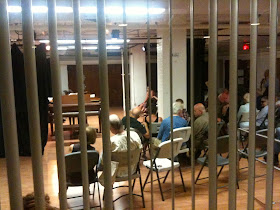The
start of the performance was marked by a piercing scream emanating from behind
us. This was followed by the performer shuffling into the room arms
outstretched and with a frozen grimace on her face. She sat at the grand piano and
started to hit octaves with her left hand while singing a somewhat mad,
cabaret-like tune in German. The man sitting on my left found it very amusing
(well, it was) and was giggling for the duration of the piece. We were at Westbeth,
an artist community on the far west side of Manhattan.
Some
forty people had gathered in the Community Room on this Friday night to
experience the eclectic performance put together by Beth. The group itself looked
interesting and it’s quite clear that one had to have somewhat special
interests for this kind of music to be here. Initially, especially, the average
age was quite high (“We’re the youngest here,” observed Yoko) and there was
even a group of sweet octogenarian ladies, but later several younger people
floated in. If we no longer were the youngest, at least I coming here from the
office without changing looked the most conventional.
Westbeth has been
around for more than four decades. Opened in 1970 in the West Village
neighbourhood, with funding from the National Endowment for the Arts and J.M.
Kaplan Foundation, Westbeth offers both a space for exhibiting a wide range of
arts, as well as affordable housing to both established and emerging artists in
different fields. The complex consists of 13 buildings surrounding a pleasant
courtyard. The Community Room is a space for music and other performing arts by
the resident artists and visitors. We were here at the invitation of tonight’s
star, singer Beth Griffith, with whom Yoko collaborated in the context of the
dancer Sachiyo Ito’s 30th
artistic anniversary performance last year.
The
program consisted of a number of avant-garde songs, like the starting number, Recitativaria (1971/72) for singing
harpsichordist by Mauricio Kagel (the harpsichord effect had been created by
placing strips of paper between the chords of the grand piano) and another
rather humorous piece for voice and piano, Orthopädische
Lieder (1994) by Susanne Meis. Beth performed the John Cage piece The Wonderful Widow of Eighteen Springs
(1942) in which the pianist Jeffrey Middleton only used the piano as a
percussion instrument banging on its sides with his hands. In Dennis
Báthory-Kitsz’ composition I Lift My
Heavy Heart (2007) she was joined by Andrew Bolotowsky on flute and Bern
Nix on guitar. This rather serious piece contained some beautiful segments in
which the voice and flute intermingled in fugue-like lines.
Two
quite lovely pieces both from 2004 were by Noah Creshevsky who was present in
the audience. He explained that, as primarily a composer of electronic music,
he had not collaborated with many performers, but had he met people like
tonight’s leading star earlier, this might have been different. In Psalm XXIII Beth sang against taped
music which contained both her own recorded voices and other electronic
instruments. The angelic choirs typical to church music were largely replaced
by sighs. The combined effect of the carefully interwoven voices and beautiful melodies
was almost heavenly. The second piece was Once,
the title of which referred to that each of the sounds on the playback tape
created by various instruments ranging from violin to trombone were only played
once.
The
first part of the concert ended with another light number, Country Time (1979) by Beth Anderson, in which Beth Griffith
recited a rhythmic poem about things associated with the countryside
accompanied by her own banging on a podium imitating the sounds of horse hooves
and her sister producing twittering sounds on a small whistle.
During
the intermission, half of the audience rushed to the courtyard for apparently
badly needed smokes.
The
latter part of the concert consisted of only one lengthy piece by John McGuire,
Beth’s husband. A Cappella (1995/97)
was also for voice and playback. It was fast paced and rhythmic flowing
smoothly and timelessly as if over an African vastness. It had a hypnotic
quality that lulled us to a sweet almost trancelike feeling. The rhythm as well
as the repeated call-and-response patterns, which Beth performed singing
invariably high and low, did have an African feeling. The piece went on for a
long while, but that was an important dimension of it and how we came to enjoy
it.
After
this interesting and enjoyable performance we walked up Washington Street, by
the High Line, past all the fashionable and funky terrace restaurants bustling
with life on the balmy July evening. People dressed up for parties were
hurrying past to meet their dates. A bald man was shouting rudely to his date,
a young woman in a yellow party dress, that it was over between them if she
jumped into that taxi (I wished she would have done so). Beefy bouncers were
screening youth for entry into the clubs from which loud music streamed out
each time the door was opened for a lucky entrant. We reflected on how
different this place must have been when Westbeth opened. Still a decade or two
ago, this area in the northwest corner of West Village was a dangerous no-man’s
land; now it was the home of high-end fashion boutiques, restaurants and
wealth. How lucky the artists were to have their own place there now.




Thank you for writing so generously about my music. I am glad that you enjoyed the psalms.
ReplyDelete